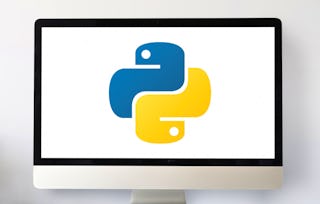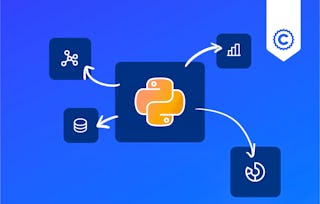Les programmes modernes sont des structures compliquées, avec des centaines voire des milliers de lignes de code, mais comment passer efficacement de programmes plus petits à des programmes plus robustes et plus compliqués ? Comment les scientifiques des données simulent-ils le caractère aléatoire des problèmes du monde réel dans leurs programmes ? Quelles techniques et meilleures pratiques pouvez-vous exploiter pour concevoir des logiciels capables de traiter efficacement de grandes quantités de données ? Dans ce cours de l'Université Duke, les utilisateurs de Python apprendront à créer des programmes plus grands et multifonctionnels qui peuvent gérer des tâches plus complexes. Nous ne recommandons pas que ce soit le premier cours de Python que vous suivez, car nous couvrirons une quantité décente de syntaxe de programmation spécifique. Cependant, si vous possédez des connaissances préalables en algèbre de base, en programmation Python et en bibliothèque Pandas, vous devriez être en mesure de compléter le matériel de ce cours. Dans le premier module, nous discuterons de la conception descendante pour les programmes plus importants, y compris la syntaxe de programmation et les techniques qui sont utiles pour assembler des programmes plus importants. Dans les modules suivants, nous aborderons les simulations de Monte-Carlo et nous vous présenterons le projet Poker, le grand programme que vous créerez à la fin du cours. À la fin de ce cours, vous devriez être en mesure de décomposer un problème de programmation en éléments gérables, d'expliquer les bases des méthodes de Monte Carlo et d'intégrer efficacement de petits morceaux de code dans un programme complet de plus grande envergure. Cela vous préparera à passer à l'étape suivante de votre parcours de scientifique des données, en créant des programmes complexes qui peuvent simuler de manière plus créative des problèmes du monde réel.

Design de données Python pour la Science des données

Design de données Python pour la Science des données
Ce cours fait partie de Spécialisation Programmation pour la science des données en Python : Des principes à la pratique



Instructeurs : Genevieve M. Lipp
Inclus avec
Expérience recommandée
Ce que vous apprendrez
Comment planifier la décomposition d'un programme en utilisant la conception descendante.
Comment intégrer des morceaux discrets de code Python dans un programme plus vaste, plus fonctionnel et plus complexe.
Compétences que vous acquerrez
- Catégorie : Pandas (paquetage Python)
- Catégorie : Pensée informatique
- Catégorie : Développement du programme
- Catégorie : Manipulation de données
- Catégorie : Tests unitaires
- Catégorie : Simulations
- Catégorie : Développement de logiciels
- Catégorie : Conception de logiciels
- Catégorie : Débogage
- Catégorie : Science des données
- Catégorie : Programmation en Python
- Catégorie : Programmation orientée objet (POO)
- Catégorie : Programmation Informatique
- Catégorie : Tests d'intégration
- Catégorie : Cas de test
Détails à connaître

Ajouter à votre profil LinkedIn
1 devoir
Découvrez comment les employés des entreprises prestigieuses maîtrisent des compétences recherchées

Élaborez votre expertise du sujet
- Apprenez de nouveaux concepts auprès d'experts du secteur
- Acquérez une compréhension de base d'un sujet ou d'un outil
- Développez des compétences professionnelles avec des projets pratiques
- Obtenez un certificat professionnel partageable

Il y a 4 modules dans ce cours
Dans ce module, vous apprendrez à appliquer les concepts que vous avez appris précédemment pour analyser des programmes plus importants. En outre, nous passerons en revue le processus de décomposition des programmes, afin de diviser un programme compliqué en étapes plus petites que nous pouvons résoudre plus facilement. Après toutes ces étapes, nous assemblerons nos pièces dans un devoir de programmation qui combine plusieurs des petits programmes que nous avons créés tout au long du module.
Inclus
6 vidéos3 lectures4 devoirs de programmation
Dans ce module, vous découvrirez les méthodes de Monte-Carlo, une technique couramment utilisée pour simuler un grand nombre de résultats possibles. Nous vous présenterons également le projet Poker sur lequel vous travaillerez pendant le reste du cours. Dans ce module, nous nous concentrerons sur la manière dont nous pouvons écrire du code pour simuler les différents résultats possibles d'une main de poker, et sur les problèmes de programmation individuels que nous devrons résoudre pour réaliser une simulation de poker complète. Vous créerez certaines de ces petites solutions dans ce module et recevrez des commentaires sur ces éléments individuels avant de passer à la synthèse de ces éléments dans le module suivant.
Inclus
1 vidéo2 lectures3 devoirs de programmation
Dans ce module, vous apprendrez à écrire des cas de test et à déboguer dans un programme Python, et vous l'appliquerez à votre projet de poker ! De plus, nous passerons à la partie évaluation logique du projet de poker, où vous écrirez le code qui permettra à votre programme de décider quelle serait une main gagnante, et où vous utiliserez certaines techniques de science des données pour aider à nettoyer les données générées par les méthodes de Monte Carlo. Comme dans l'unité précédente, vous écrirez ces différentes parties du programme et recevrez des commentaires, avant de passer à l'unité suivante, où nous synthétiserons toutes ces parties en une simulation complète de main de poker.
Inclus
1 lecture1 devoir3 devoirs de programmation
Dans ce module, nous allons intégrer toutes les sections individuelles du code Python que nous avons écrites tout au long du cours dans un programme plus vaste. Cela nécessitera probablement un peu de dépannage et de réflexion pour faire fonctionner tous les morceaux de code précédents, mais vous tirerez parti des cas de test et des compétences que vous avez acquises dans le module précédent pour y parvenir. Nous aborderons également les références d'objets, un moyen de référencer directement un morceau de mémoire, afin de mettre à jour efficacement les informations que les différentes parties de votre programme utiliseront. Après tout cela, nous vous donnerons un retour sur votre projet final de poker, puis nous vous demanderons de faire une courte réflexion sur votre projet de poker et sur l'expérience que vous avez eue en créant un programme plus large à partir de ses composants discrets.
Inclus
1 vidéo2 lectures2 devoirs de programmation1 sujet de discussion
Obtenez un certificat professionnel
Ajoutez ce titre à votre profil LinkedIn, à votre curriculum vitae ou à votre CV. Partagez-le sur les médias sociaux et dans votre évaluation des performances.
Offert par
En savoir plus sur Développement de logiciels
 Statut : Essai gratuit
Statut : Essai gratuitDuke University
 Statut : Prévisualisation
Statut : PrévisualisationUniversity of Leeds
 Statut : Essai gratuit
Statut : Essai gratuit Statut : Essai gratuit
Statut : Essai gratuit
Pour quelles raisons les étudiants sur Coursera nous choisissent-ils pour leur carrière ?

Felipe M.

Jennifer J.

Larry W.

Chaitanya A.

Ouvrez de nouvelles portes avec Coursera Plus
Accès illimité à 10,000+ cours de niveau international, projets pratiques et programmes de certification prêts à l'emploi - tous inclus dans votre abonnement.
Faites progresser votre carrière avec un diplôme en ligne
Obtenez un diplôme auprès d’universités de renommée mondiale - 100 % en ligne
Rejoignez plus de 3 400 entreprises mondiales qui ont choisi Coursera pour les affaires
Améliorez les compétences de vos employés pour exceller dans l’économie numérique
Foire Aux Questions
Pour accéder aux supports de cours, aux devoirs et pour obtenir un certificat, vous devez acheter l'expérience de certificat lorsque vous vous inscrivez à un cours. Vous pouvez essayer un essai gratuit ou demander une aide financière. Le cours peut proposer l'option "Cours complet, pas de certificat". Cette option vous permet de consulter tous les supports de cours, de soumettre les évaluations requises et d'obtenir une note finale. Cela signifie également que vous ne pourrez pas acheter un certificat d'expérience.
Lorsque vous vous inscrivez au cours, vous avez accès à tous les cours de la spécialisation et vous obtenez un certificat lorsque vous terminez le travail. Votre certificat électronique sera ajouté à votre page Réalisations - de là, vous pouvez imprimer votre certificat ou l'ajouter à votre profil LinkedIn.
Oui, pour certains programmes de formation, vous pouvez demander une aide financière ou une bourse si vous n'avez pas les moyens de payer les frais d'inscription. Si une aide financière ou une bourse est disponible pour votre programme de formation, vous trouverez un lien de demande sur la page de description.
Plus de questions
Aide financière disponible,


